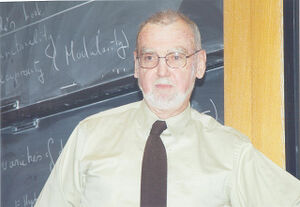Robert Langlands (nonfiction): Difference between revisions
Jump to navigation
Jump to search
(Created page with "thumb|Robert Langlands.'''Robert Phelan Langlands''' (/ˈlæŋləndz/; born October 6, 1936) is an American-Canadian mathematician. He is best k...") |
|||
| (2 intermediate revisions by the same user not shown) | |||
| Line 12: | Line 12: | ||
== Fiction cross-reference == | == Fiction cross-reference == | ||
* [[ | * [[Mathematics]] | ||
== Nonfiction cross-reference == | == Nonfiction cross-reference == | ||
* [[Langlands program (nonfiction)]] | |||
* [[Mathematician (nonfiction)]] | * [[Mathematician (nonfiction)]] | ||
| Line 27: | Line 27: | ||
[[Category:Mathematicians (nonfiction)]] | [[Category:Mathematicians (nonfiction)]] | ||
[[Category:People (nonfiction)]] | [[Category:People (nonfiction)]] | ||
[[Category:People, living (nonfiction)]] | |||
Latest revision as of 14:35, 22 November 2017
Robert Phelan Langlands (/ˈlæŋləndz/; born October 6, 1936) is an American-Canadian mathematician.
He is best known as the founder of the Langlands program, a vast web of conjectures and results connecting representation theory and automorphic forms to the study of Galois groups in number theory.
He is an emeritus professor and occupies Albert Einstein's office at the Institute for Advanced Study in Princeton.
In the News
Fiction cross-reference
Nonfiction cross-reference
External links:
- Robert Langlands @ Wikipedia
